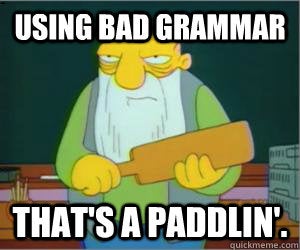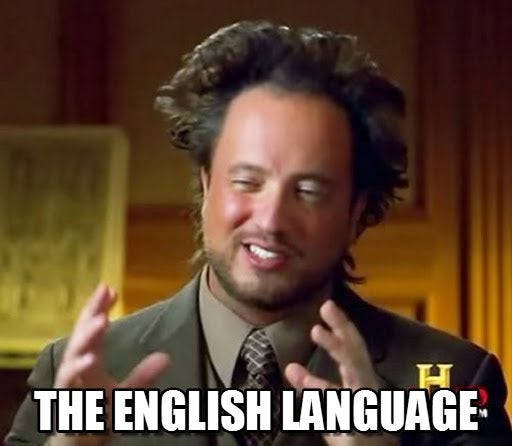Grammar is a tricky, uh, thing?
A weird thing about grammar is how it’s perceived. Perhaps, the best way to describe this is to distinguish between the dominant perceptions that I experience on a daily basis. I’ll preface this by saying these are mostly applicable to native English speakers. That said, I’ll touch on non-native speaker perceptions before we’re done (hint: I respect you all immensely). Also, I'll acknowledge now that this is merely my own experience with grammar. I don't intend to speak too strongly for everyone else. So if you have any suggestions, give me a shout in the comment box below!
The first perception is a form of learned animosity. Often, people (and students in particular) seem to think of grammar as an arbitrary litany of rules, begrudgingly learning what they have to just to get out of high school English. Nobody likes you, semicolon. Commas and colons both think you’re a weirdo. Go home. Gerunds? I’m sorry, what was that? Gare-ends? Jerrunds? Whatever, forget it.

I swear, those Language Power textbooks were a blast. Do they still use those?
The second perception is a sort of non-perception. Since we learn the basics of the language (unconsciously and orally) from an early age, there are certain rules we don’t really have to think that much about; we just know, you know? Nobody really cares what an article does, but you know that you need to say “the”, “a”, or “an” sometimes to make meaning out of something. Hey, you might not have even known that those were called “articles” until this moment. They’re a type of adjective that introduces a noun. Neat.
If you already knew that, I guess I need another fun fact. Did you know that if you stood on the top of the tallest mountain on Mars, you’d be unable to perceive the base of the mountain because the slope would be obscured by the curvature of the planet itself?
That may have been an accidental analogy for the sheer vastness of grammatical possibility. I'm not sure.
Anyway, the point is that both of these perceptions are totally reasonable responses. Why? Because we’re—largely—taught to think about grammar in fundamentally backwards ways. Rather than being taught what the grammatical rules are accomplishing and why they're justified, it’s more like “here’s the rule, fill out this page of example questions, and move on to the next set of rules”. Sure, you can show basic competency for the one day you're studying a certain concept and it gets the job done. However, the limitations of workbook grammar exercises are 1) how you learn a wide variety of concepts at once, and 2) how you depend on the instructions and prompts rather than seeing and learning the process yourself through your own writing process.
However, the latter non-perception hints towards a more realistic and effective way that we can think about grammar. The first thing to remember is that learning grammar is an organic process, a sort of slow-burn. You can’t just “get it” all at once. This organic process is a part of how we, as native speakers, develop this inherent non-perception I mentioned before. You just unconsciously know what a “proper” sentence usually sounds or looks like. Similarly, if you take an incremental approach to grammar—learn single concepts at a time, build up a knowledge bank, experiment with new concepts—it’s far more likely that you’ll learn something that sticks. This long process is why cramming grammar into the confines of high school English class isn’t an overly effective pedagogical strategy.
The second thing to remember is that grammar’s fundamental purpose is to make meaning as clear as possible. That’s all. When encountering grammatical concepts, ask yourself “if this rule didn’t exist, where would the meaning of this sentence get lost? What would change about the meaning of an idea I’m trying to convey? What is the central idea I’m trying to communicate?”.

Image from Pinterest
I pose these questions because identifying gaps in meaning can be just as effective as examining the meaning itself; it makes you think critically and comparatively. Think about the difference between “Let’s eat, grandma!” and “Let’s eat grandma!”. One sentence is about a family sitting down to enjoy a meal. The other one ends with a grandson in the back of a cop car, or at the very least a case of serious indigestion. It all hinges on the comma, serving as a simple reminder of why we use grammar. It doesn’t exist just to sell Language Power textbooks or irritate you; it exists to guarantee meaning in language.
I’ll close up with a comment on non-native English speakers. When they learn English later in their lives, they have the opposite experience of native speakers. Often, they begin formally with the grammatical and mechanical aspects of English and build up. Consequently, they usually have a better knowledge of grammar than most native speakers (myself included). It’s pretty mind-blowing; I can’t imagine having to start from scratch with English because it’s a pretty messy language with a lot of semi-consistent rules and borrowed epistemologies. They end up accelerating the organic process of understanding grammar, which is incredibly difficult.

Image from Memegen.com
Working with these students has reminded me how tricky grammar can be to master, but it’s also taught me that learning about grammar (and language generally) is a lifelong process. Non-native speakers are necessarily tuned into this fact because it's an important part of feeling comfortable in a different language environment. This isn’t just about learning grammar to write a lab report; this is about life.
This awareness possibly keeps them from falling into the aforementioned non-perception group, and keeps them engaged with language in a totally different way. It may benefit us as native speakers to reconsider grammar and language from this perspective; if it doesn’t change the way you write in your personal, academic, or professional life, then it may at least change the way you see people who are new to the English language.